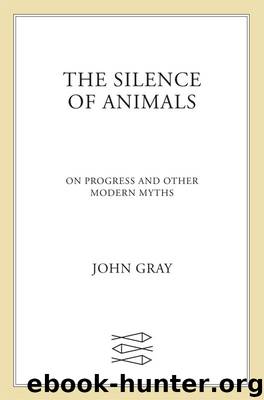The Silence of Animals by Gray John

Author:Gray, John
Language: eng
Format: epub
Publisher: Farrar, Straus and Giroux
Published: 2013-06-03T16:00:00+00:00
JUNG’S ARYAN UNCONSCIOUS, OR WHAT MYTHS ARE NOT
Freud held back from considering ways in which myth might be renewed. His errant colleague Carl Jung had shown where that led. Jung’s thought is interesting not because it has any value in itself, but for showing how psychology can become the vehicle for a new religion – a development that Freud always resisted. With Jung the therapist became a modern conductor of souls into the underworld. But the underworld into which Jung wanted to take humanity was his own invention, which he devised partly in order to obscure his behaviour in the years when Nazism seemed about to conquer Europe.
Jung’s ideas about myth did not originate with him or with Freud. Preceding Jung’s encounter with psychoanalysis, they were part of the intellectual ferment of late nineteenth-century and early twentieth-century Germany. At that time, occultist and theosophical sects and movements trying to develop a science-based evolutionary religion were powerful forces. The leading figure in this project was Ernst Haeckel (1834–1919), a professor of zoology at the University of Jena who commanded an enormous following in the German-speaking world. Haeckel’s project was the creation of a new religion grounded in scientific materialism and evolutionary theory, which he called Monism. More responsible than any other thinker for the spread of Darwinism in Europe and the inventor of the science of ecology, Haeckel also promoted the idea that the human species was made up of a hierarchy of racial groups, while applied eugenics could enhance the quality of the population. These ideas would be the unifying creed of a pantheist church, which would supplant Christianity.
By the turn of the century there were Monist groups all over central Europe. Joined together in 1906 in a Monist League led by Haeckel, they included the founder of Positivism Ernst Mach, numerous Darwinian scientists, one of the founders of modern sociology Ferdinand Tönnies and the influential occultist Rudolf Steiner. A number of figures who later became prominent figures in the German communist party were members, as were some who became Nazis. Haeckel was a member of the Thule Society, a secret organization of radical nationalists to which Rudolf Hess, later Hitler’s deputy, also belonged. After the Second World War, Haeckel would be celebrated as an intellectual hero in the communist German Democratic Republic.
For these figures an evolutionary religion was extremely attractive. Having in common a virulent hostility to Christian and Jewish traditions (many, including Haeckel himself, were explicitly anti-Semitic), they wanted a new religion in which modern science would be combined with ancient modes of thinking. Haeckel believed that conscious thought was grounded in archaic mental processes. Other thinkers connected with völkisch movements, who longed for a return of the ‘organic’ cultures they believed had existed in the past, promoted the idea that whole peoples have souls. Volk – etymologically linked with the English word ‘folk’ – meant a community or way of life that had not been disturbed by critical thought. Reviving this imaginary folk-world meant expelling or otherwise neutralizing minorities that might disturb the communal peace.
Download
This site does not store any files on its server. We only index and link to content provided by other sites. Please contact the content providers to delete copyright contents if any and email us, we'll remove relevant links or contents immediately.
| Deconstruction | Existentialism |
| Humanism | Phenomenology |
| Pragmatism | Rationalism |
| Structuralism | Transcendentalism |
| Utilitarianism |
The remains of the day by Kazuo Ishiguro(8961)
Tools of Titans by Timothy Ferriss(8359)
Giovanni's Room by James Baldwin(7313)
The Black Swan by Nassim Nicholas Taleb(7097)
Inner Engineering: A Yogi's Guide to Joy by Sadhguru(6782)
The Way of Zen by Alan W. Watts(6589)
Asking the Right Questions: A Guide to Critical Thinking by M. Neil Browne & Stuart M. Keeley(5751)
The Power of Now: A Guide to Spiritual Enlightenment by Eckhart Tolle(5741)
The Six Wives Of Henry VIII (WOMEN IN HISTORY) by Fraser Antonia(5493)
Astrophysics for People in a Hurry by Neil DeGrasse Tyson(5172)
Housekeeping by Marilynne Robinson(4432)
12 Rules for Life by Jordan B. Peterson(4298)
Double Down (Diary of a Wimpy Kid Book 11) by Jeff Kinney(4257)
The Ethical Slut by Janet W. Hardy(4235)
Skin in the Game by Nassim Nicholas Taleb(4231)
Ikigai by Héctor García & Francesc Miralles(4228)
The Art of Happiness by The Dalai Lama(4118)
Skin in the Game: Hidden Asymmetries in Daily Life by Nassim Nicholas Taleb(3985)
Walking by Henry David Thoreau(3948)
